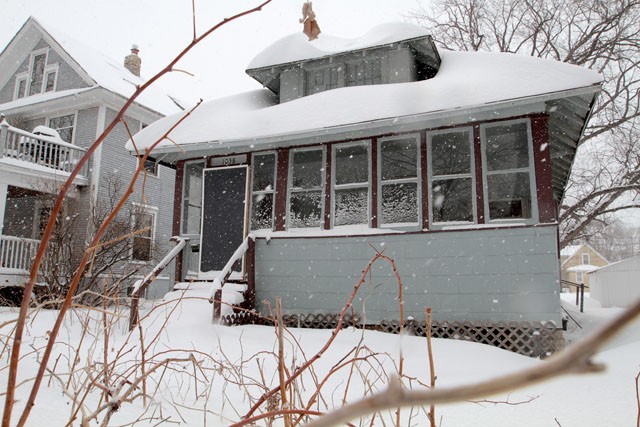The empty house on 14th Avenue Southeast in the Como neighborhood looks like any other vacant building in Minneapolis.
Previously rented out, the property was boarded up in 2006 after the city of Minneapolis revoked owner Mei Jen ChenâÄôs license after her repeated failure to comply with maintenance rules. ChenâÄôs loss of license meant that she was barred from renting out any of her five properties, four of which are in southeast Como.
But despite the probation, Chen didnâÄôt cease being a headache for the city.
Over the past five years, including as recently as a couple of weeks ago, Chen has been renting the Como neighborhood house out for money, Housing Inspections Services Director Tom Deegan said.
The city had found illegal tenants living at ChenâÄôs five properties on multiple occasions over the past five years, Deegan said.
In one case, after the city evicted an individual from one house, he was simply moved to another of ChenâÄôs properties, he said.
Jeremiah Peterson lives across the street from one of the properties and has monitored the house. Peterson has reported to the city whenever he noticed a possible new renter and said the tenants Chen finds are often “disreputable” and “Section 8 people.”
“The people [Chen and her husband] rent to are not like you and me,” Deegan said.
Chen, like many problem landlords in Minneapolis, had a history of run-ins with city inspectors.
The city inspects all properties to ensure maintenance and safety standards are met, however, most rental buildings are only checked every six years, Housing Inspections Services Deputy Director JoAnn Velde said.
Recently, the city created a “tier inspection” system to streamline the process.
The new system will be based on dividing 20,000 rental buildings in Minneapolis into three tiers. The bottom tier of “problem properties” will be inspected annually. The second tier, every two to five years, and the top tier, or the best rental properties, will be checked on a five- to eight-year cycle, Velde said.
The idea is to provide owners with an incentive to follow the maintenance regulations to ensure the buildings are safe for tenants, Deegan said.
“A rental license is a benefit to an owner, and therefore they should adhere to our standards âĦ to enjoy that privilege,” he said.
Deegan said the program should be in place by April 1.
But for Ward 1 Councilman Kevin Reich, more inspections might not be enough to address problem landlords like Chen.
Over the years the city has continually had to deal with ChenâÄôs properties in southeast Como, often ridding them of squatters. After she lost her license, all of ChenâÄôs properties were ruled vacant.
Under city law, a vacant building must remain empty until ruled otherwise. Neither the owner nor any tenants can live in it.
Dealing with such cases takes “an enormous amount of city resources” in time and manpower, Deegan said.
Vacant properties are monitored but are not regularly inspected unless someone complains to the city. Then, an inspector has to take time off scheduled inspections, Deegan said.
Currently there are more than 800 vacant properties citywide.
“ItâÄôs a lot of work to try and catch these people,” Deegan said of illegal renters.
In June, Chen will have the option to present her case to the City Council to try to get her rental license back.
In that case, DeeganâÄôs unit would investigate the property for the city, a process that could take weeks for each of ChenâÄôs five properties, he said.
But for Reich the decision is clear even without the evidence.
He said the cityâÄôs current review system is not enough to weed out “the worst of the worst.”
To address the issue of irresponsible renters, he said, the city needs to implement a tougher system like a higher fee for reinstating a license or a potential moratorium.
“We need to raise the bar,” he said.








